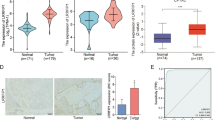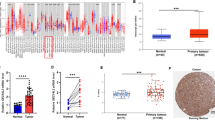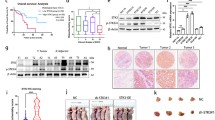Abstract
Background
The chromodomain helicase/ATPase DNA binding protein 1-like gene (CHD1L) plays a key role in controlling various cellular phenomena, including immune-mediated inflammation, transformation, apoptosis, cell cycle progression, and proliferation.
Methods
This study investigated the function and clinical significance of CHD1L protein expression in pancreatic cancer (PC). We analyzed CHD1L expression in surgical specimens from 112 PC patients. The correlation between the clinical characteristics and prognosis was also determined. Futhermore, cell proliferation were measured using EDU, and a molecular mechanism of Wnt/β-catenin pathway regulation by CHD1L was explored.
Result
CHD1L protein expression was significantly higher in PC patients with regard to the tumor grade, stage, size, differentiation and lymph node status. Increased CHD1L protein expression was significantly associated with poor overall survival. Multivariate analyses revealed that high CHD1L expression was an independent predictive marker for the recurrence and poor prognosis of pancreatic cancer. Furthermore, silencing of CHD1L expression by RNAi effectively abolished the proliferative abilities of CHD1L in vivo and in vitro. We found that the Wnt/β-catenin pathway contributed to the effect of CHD1L-mediated pancreatic cancer proliferation.
Conclusion
Taken together, our data provide a novel evidence for the biological and clinical significance of CHD1L as a potential biomarker, and we demonstrate that CHD1L-Wnt/β-catenin might be a novel pathway involved in pancreatic cancer progression.




Similar content being viewed by others
References
Khan MA, Zubair H, Srivastava SK, Singh S, Singh AP. Insights into the role of microRNAs in PC pathogenesis: potential for diagnosis, prognosis, and therapy. Adv Exp Med Biol. 2015;889:71–87.
Grapsa D, Saif MW, Syrigos K. Targeted therapies for pancreatic adenocarcinoma: where do we stand, how far can we go? World J Gastrointest Oncol. 2015;7:172–177.
Clark CE, Beatty GL, Vonderheide RH. Immunosurveillance of pancreatic adenocarcinoma: insights from genetically engineered mouse models of cancer. Cancer Lett. 2009;279:1–7.
Vasseur S, Tomasini R, Tournaire R, Iovanna JL. Hypoxia induced tumor metabolic switch contributes to PC aggressiveness. Cancers (Basel). 2010;2:2138–2152.
Matsumoto G, Nagai S, Muta M, Tsuruta K, Okamoto A, Toi M. Survival benefit of krn7000 immune therapy in combination with tnp470 in hamster liver metastasis model of PC. Oncol Rep. 2003;10:1201–1206.
Biran N, Malhotra J, Bagiella E, Cho HJ, Jagannath S, Chari A. Patients with newly diagnosed multiple myeloma and chromosome 1 amplification have poor outcomes despite the use of novel triplet regimens. Am J Hematol. 2014;89:616–620.
Mu QJ, Li HL, Yao Y, Liu SC, Yin CG, Ma XZ. Chromodomain helicase/atpase dna-binding protein 1-like gene (chd1 l) expression and implications for invasion and metastasis of breast cancer. PLoS ONE. 2015;10:e143030.
Harvard C, Strong E, Mercier E, et al. Understanding the impact of 1q21.1 copy number variant. Orphanet J Rare Dis. 2011;6:54.
Xu X, He Y, Miao X, et al. Cell adhesion induces overexpression of chromodomain helicase/ATPase DNA binding protein 1-like gene (CHD1L) and contributes to cell adhesion-mediated drug resistance (CAM-DR) in multiple myeloma cells. Leuk Res. 2016;47:54–62.
He LR, Ma NF, Chen JW, et al. Overexpression of chd1 l is positively associated with metastasis of lung adenocarcinoma and predicts patients poor survival. Oncotarget. 2015;6:31181–31190.
Liu M, Chen L, Ma NF, et al. Chd1 l promotes lineage reversion of hepatocellular carcinoma through opening chromatin for key developmental transcription factors. Hepatology. 2016;63:1544–1559.
Chen L, Yuan YF, Li Y, et al. Clinical significance of chd1 l in hepatocellular carcinoma and therapeutic potentials of virus-mediated chd1 l depletion. Gut. 2011;60:534–543.
Hyeon J, Ahn S, Park CK. Chd1 l is a marker for poor prognosis of hepatocellular carcinoma after surgical resection. Korean J Pathol. 2013;47:9–15.
Ji X, Li J, Zhu L, et al. Chd1 l promotes tumor progression and predicts survival in colorectal carcinoma. J Surg Res. 2013;185:84–91.
Li M, Zhou W, Yuan R, et al. Rock2 promotes hcc proliferation by cebpd inhibition through phospho-gsk3beta/beta-catenin signaling. FEBS Lett. 2015;589:1018–1025.
Tan J, You Y, Guo F, Xu J, Dai H, Bie P. Association of elevated risk of pancreatic cancer in diabetic patients: a systematic review and meta-analysis. Oncol Lett. 2017;13:1247–1255.
Wang Y, Lin J, Cui J, et al. Prognostic value and clinicopathological features of PD-1/PD-L1 expression with mismatch repair status and desmoplastic stroma in Chinese patients with pancreatic cancer. Oncotarget. 2017;8:9354–9365.
Xu W, Xu B, Yao Y, et al. Overexpression and biological function of iqgap3 in human PC. Am J Transl Res. 2016;8:5421–5432.
Garajova I, Le Large TY, Giovannetti E, Kazemier G, Biasco G, Peters GJ. The role of microRNAs in resistance to current PC treatment: translational studies and basic protocols for extraction and pcr analysis. Methods Mol Biol. 2016;1395:163–187.
Shaib WL, Ip A, Cardona K, et al. Contemporary management of borderline resectable and locally advanced unresectable PC. Oncologist. 2016;21:178–187.
Guo K, Cui J, Quan M, et al. The novel KLF4/MSI2 signaling pathway regulates growth and metastasis of pancreatic cancer. Clin Cancer Res. 2017;23:687–696.
Aboukameel A, Muqbil I, Senapedis W, et al. Novel p21-activated kinase 4 (pak4) allosteric modulators overcome drug resistance and stemness in pancreatic ductal adenocarcinoma. Mol Cancer Ther. 2017;16:76–87.
Yu Q, Zhou X, Xia Q, et al. Long non-coding rna ccat1 that can be activated by c-myc promotes PC cell proliferation and migration. Am J Transl Res. 2016;8:5444–5454.
Wang P, Chen L, Zhang J, et al. Methylation-mediated silencing of the miR-124 genes facilitates pancreatic cancer progression and metastasis by targeting Rac1. Oncogene. 2014;33:514–524.
Cai X, Ding H, Liu Y, et al. Expression of HMGB2 indicates worse survival of patients and is required for the maintenance of Warburg effect in pancreatic cancer. Acta Biochim Biophys Sin (Shanghai). 2017;49:119–127.
Su Z, Zhao J, Xian G, et al. Chd1 l is a novel independent prognostic factor for gastric cancer. Clin Transl Oncol. 2014;16:702–707.
Chen L, Chan TH, Yuan YF, et al. Chd1 l promotes hepatocellular carcinoma progression and metastasis in mice and is associated with these processes in human patients. J Clin Invest. 2010;120:1178–1191.
Acknowledgments
This study was supported by grants from the National Natural Science Foundation of China (No. 81200091). This work was supported by the Science and Technology Department of Jiangxi Province, China (No. 20143BBM26054).
Author information
Authors and Affiliations
Corresponding authors
Ethics declarations
Conflict of interest
The authors declare no conflict of interest.
Rights and permissions
About this article
Cite this article
Liu, C., Fu, X., Zhong, Z. et al. CHD1L Expression Increases Tumor Progression and Acts as a Predictive Biomarker for Poor Prognosis in Pancreatic Cancer. Dig Dis Sci 62, 2376–2385 (2017). https://doi.org/10.1007/s10620-017-4641-8
Received:
Accepted:
Published:
Issue Date:
DOI: https://doi.org/10.1007/s10620-017-4641-8




